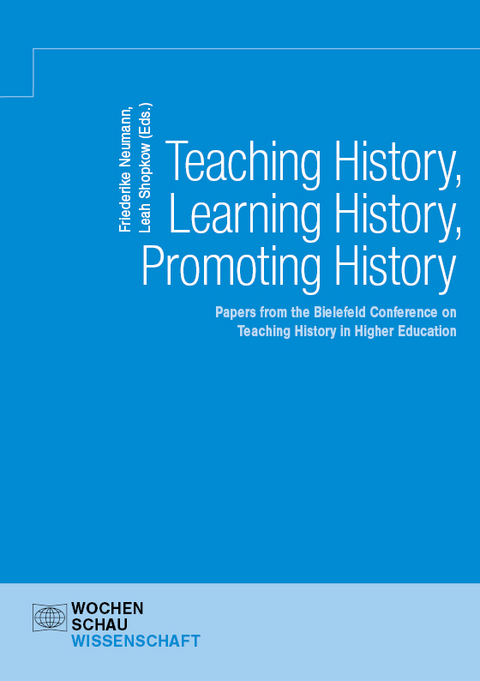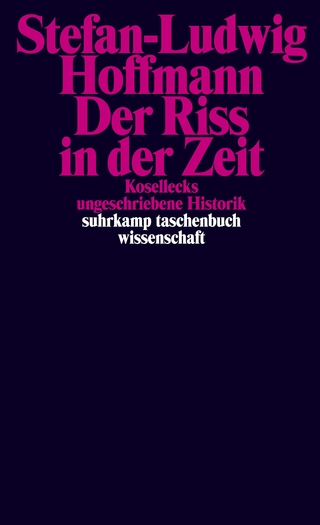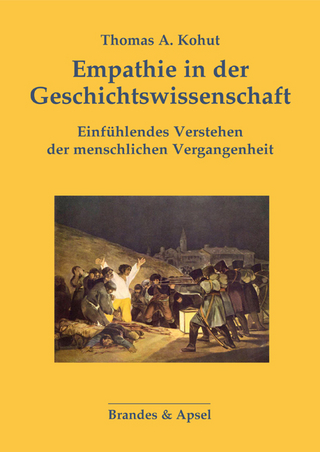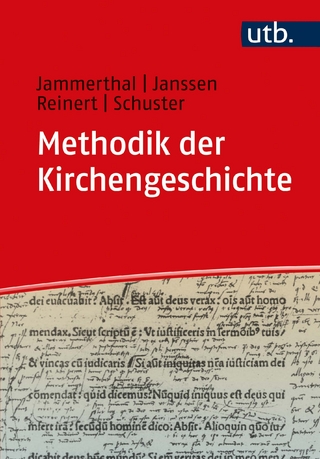
Teaching History, Learning History, Promoting History
Wochenschau Verlag
978-3-7344-0685-0 (ISBN)
Aline Breuer was a student of history at the University of Mainz at the time this contribution was written. She worked as research assistant in the project that provided the data for this publication. In the meantime, she has started a Ph.D. thesis on Soviet Cinema. Peter D’Sena is a Learning and Teaching Specialist at the University of Hertfordshire, UK and a Senior Research Fellow at the Institute of Historical Research, London. After fifteen years as a schoolteacher he spent twenty years in universities as a history teacher-educator and, ultimately, as a head of department. Later, as Discipline Lead for History at the Higher Education Academy, he coordinated and led UK-wide projects and publications on teaching and learning in history across the university sector. His research and publications have embraced work on crime in eighteenth-century London, cultural diversity and the global dimension in history education, and the Brown Atlantic. Dennis (Denny) Frey Jr. is an Associate Professor of History at Lasell College. His research interests are focused on southwest Germany (Swabia) during the eighteenth and early nineteenth centuries. His recent publications include “‘Alles Geld gehet immer auf …’: Money in an Emerging Consumer & Cash Economy, Göppingen (1735 – 1860),” in Money in the German-speaking Lands (Spektrum Series Book 17), edited by Mary Lindemann and Jared C. Poley (New York: Berghahn Books, 2017) and “Canaries & Pigeons on the Threshold: An Eighteenth-Century Case Study of Liminal Animal Lives in a Southwest German Hometown,” in Animal History and the Modern City: Exploring Liminality, edited by Clemens Wischermann, Aline Steinbrecher, and Philip Howell (London: Bloomsbury Publishing, forthcoming 2018). Andreas Frings is senior lecturer at the Department of History at the University of Mainz and responsible for the organisation, communication and coordination of teaching and courses in history. His research interests include the didactics of history teaching at university level. His recent publications include Geschichte als Wissenschaft lehren: Theorieorientierung im Studieneinstieg, (Schwalbach/Ts.: Wochenschau Verlag, 2016). KG Hammarlund is Senior Lecturer and Subject Leader in History Education at Halmstad University, Sweden. His research interests include epistemological issues of history teaching and learning in secondary and higher education. Recent publications include “Continuous Assessment of Historical Knowledge and Competence: Challenges, Pitfalls, and Possibilities” in Enriching History Teaching and Learning: Challenges, Possibilities, Practice, edited by David Ludvigsson & Alan Booth (2015) and “Teaching History in a multicultural society – Trends and tendencies in Nordic schools,” Nordicum-Mediterraneum 10:2 (2015). Richard A. Hawkins is Reader in History in the Department of History, Politics and War Studies at the University of Wolverhampton. His current research interests include work place learning and the role of Big Data in research and teaching. His publications include “Promoting the digital literacy of undergraduate historians using digitised historic newspapers,” Student Engagement in Higher Education Journal 1:1 (2016) and the chapter “The Use of Big Data in Historical Research” in Big Data in the Arts and Humanities: Theory and Practice, edited by Giovanni Schiuma and Daniela Carlucci (Boca Raton: CRC Press, 2018). Diana Jeater is a member of the history department at the University of Liverpool and Emeritus Professor of African History at UWE, Bristol. At UWE she developed a pedagogy for preparing undergraduate students for dissertation work, based in reflective hands-on experience for each of the distinct skills involved in historical research. At Liverpool, she is leading a project to embed reflective practice and employability awareness into the teaching of history, modern languages, politics and archaeology. When not busy developing ways to nurture undergraduate skills, she researches on Zimbabwe, has published two monographs, and is an editor of the Journal of Southern African Studies. Andreas Linsenmann is senior lecturer at the Department of History at theUniversity of Mainz and assists with the organisation, communication and coordination of teaching and courses in history. His research interests include French-German Relations, Religious History, Cultural History, Music and Politics. His recent publications include (together with Andreas Frings) “‘Geschichte können’ – ein Projekt zur Förderung eines produktiven Studienverlaufs und der Beschäftigungsfähigkeit von Absolventen” in Employability als Ziel universitärer Lehre. Innovative Lehrprojekte an der JGU, edited by Marie-Theres Moritz (Bielefeld, 2015), 25 – 34; “Von ‘Geschi’ zu ‘Geschichtswissenschaft’ – Wege ins geschichtswissenschaftliche Studium,” Zeitschrift für Hochschulentwicklung 9:5 (2014), 149 – 161. Friederike Neumann is a lecturer and research associate in the Department of History at Bielefeld University. She works in the framework of Bielefeld University’s programme ‘Getting Started’ (richtig einsteigen) that is funded by the Quality Pact for Teaching, a joint programme of Germany’s federal government and the federal states. The focus of her work is developing ways of teaching students how to read and write like historians. Among her publications is Schreiben im Geschichtsstudium (Opladen & Toronto: Verlag Barbara Budrich, 2018). Jörg van Norden, Senior Lecturer in History and Didactics at Bielefeld University. His research interests are Time, Narrativity, Memory, Historical Culture, Historical Consciousness, Didactics. His recent publications include “Bewusstsein, Erinnerung, Gedächtnis, Kultur – Historisches Denken zwischen individueller Autonomie und kollektiver Normativität,” Zeitschrift für Geschichtsdidaktik 15 (2017), 9 – 23; “Wie entwickelt sich narrative Kompetenz im Geschichtsunterricht. Eine qualitative Studie,” Zeitschrift für Geschichtsdidaktik 16 (2017), 149 – 164 (co-authored with Vanessa Neumann and Wanda Schürenberg). Dr Adele Nye is a Senior Lecturer at the School of Education University of New England, NSW Australia. Her research interests include historical thinking and practice and the history discipline in Australian Universities. Adele has a co-edited book in press entitled Teaching the Discipline of History in an Age of Standards with Professor Jennifer Clark. Her other recent publications include “Rethinking Evidence: Assessment in the History Discipline in Australian Universities” in Transgressing Boundaries, Transforming Higher Education Global Innovations in Teaching & Learning, edited by Prudence Layne and Peter Lake (Springer, 2015), 91 – 106; “Historical Thinking and Objects of Nostalgia,” International Journal of Research on History Didactics, History Education and History Culture: Yearbook of the International Society of History Didactics 37 (2016): 37 – 57; and (with Jennifer Clark) “‘Surprise Me!’:The (im)possibilities of agency and creativity within the standards framework of history education,” Educational Philosophy and Theory 49:6 (2017): 656 – 668. David Pace is Professor Emeritus in the History Department at Indiana University Bloomington. His work is in the scholarship of teaching and learning, Decoding the Disciplines, and modern European intellectual history. Leah Shopkow is a professor of History at Indiana University–Bloomington. A specialist in the history of medieval western Europe, particularly historical writing, she has recently published a translation of the Chronicle of Andres (Washington, D.C.: Catholic University of America Press, 2017) and “Mooning the Abbot: A Tale of Disorder, Vulgarity, Ethnicity, and Underwear in the Monastery,” in Prowess, Piety, and Public Order: Intersections of Medieval Political Community Studies in Honor of Richard W. Kaeuper, edited by Craig M. Nakashian and Daniel P. Franke (Leiden: Brill, 2017). Her other hat is in teaching and learning, a field in which she has recently published (as second author with Joan Middendorf) Overcoming Student Learning Bottlenecks: Decode the Critical Thinking of Your Discipline (Sterling, VA: Stylus, 2017). Jelena Suchan was a student of history at the University of Mainz at the time of writing this contribution. She worked as research assistant in the project that provided the data for this publication. In the meantime she completed her teaching traineeship as teacher for history and philosophy. Harvey Woolf was Head of Academic Standards at the University of Wolverhampton. His current research interests include work place learning and the relationship between academic assessment regulations and student achievement. His recent publications include “Academic standards and regulatory frameworks: necessary compromises?”, Assessment & Evaluation in Higher Education 41:4 (2016) (with Marie Stowell and Marie Falahee) and (with Wayne Turnbull) “Winning the progression lottery owes more to luck than academic judgement: consequences for students of regulatory variation in the UKHE sector” (May, 2017), a report for The Northern Universities Consortium for Credit Accumulation and Transfer (NUCCAT) (available from http://www.nuc.ac.uk/wp-content/uploads/2018/02/The-Progression-Lottery.pdf) which explores the different ways in which institutions manage students who fail at least one Level 4 [First Year] module.
Friederike Neumann/Leah Shopkow
Editors’ Note
Peter D’Sena
Introduction
Leah Shopkow
Epistemology and Tacit Knowledge: The Disconnect between Understandings of History
Dennis Frey Jr.
From Chronological Narrative to Inquiry & Analysis: A Structural Shift in Teaching World History
KG Hammarlund
Authentic Assessment in History Education: Emphasising the “Usefulness” of History
Diana Jeater
‘Theory’ as the Practice of Asking Questions: Moving Second Year History Undergraduates from Knowledge Acquisition to Knowledge
Construction in a UK University
David Pace
Decoding Historical Interpretation: Teaching Systematic Questioning
Richard A. Hawkins and Harvey Woolf
Good Practice in British Higher Education History Work Placement Learning
Adele Nye
‘Why Study History?’: An Examination of Online Statements in Australian Universities 2008 – 2016
Aline Breuer, Andreas Frings, Andreas Linsenmann, and Jelena Suchan
Empirical Observations and Pedagogical Considerations on the Diversity of and Differences among Beginning Students in the Discipline of History
Jörg van Norden
Students and Their ‘Idea of History’: A Theory‑based Testing of Hermeneutical and Narrative Competencies
List of Contributors
| Erscheinungsdatum | 13.09.2018 |
|---|---|
| Reihe/Serie | Wochenschau Wissenschaft |
| Verlagsort | Frankfurt am Main |
| Sprache | englisch |
| Maße | 148 x 210 mm |
| Gewicht | 264 g |
| Themenwelt | Geisteswissenschaften ► Geschichte ► Geschichtstheorie / Historik |
| Sozialwissenschaften ► Pädagogik | |
| Schlagworte | Geschichte unterrichten • Hochschuldidaktik • Scholarship of teaching and learning • teaching history |
| ISBN-10 | 3-7344-0685-4 / 3734406854 |
| ISBN-13 | 978-3-7344-0685-0 / 9783734406850 |
| Zustand | Neuware |
| Haben Sie eine Frage zum Produkt? |
aus dem Bereich


